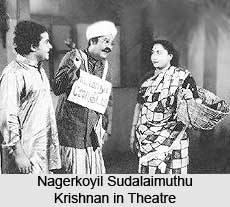 Nagerkoyil Sudalaimuthu Krishnan was a Tamil theatre personality. He was born in Nagercoil, he joined the Bala Shanmugananda Sabha of T. K. S. Brothers at the age of 17 and became a noted stage performer. When the talkies arrived on the Tamil scene in the mid-1950s, producers inevitably turned to the popular actors and actresses of Tamil theatre to star in movies. Nagerkoyil Sudalaimuthu Krishnan entered cinema as early as 1935 in T. K. S.`s Menaka, and starred in eighty-three films before his premature death. As a performer, his penchant was to stand out and do things in his own way. This showed up early in his teens and continued in his movie career with even greater success and popular acclaim. Nagerkoyil Sudalaimuthu Krishnan was not in the mould of usual actors, handed a role as penned in the script and asked to play it as the directors dictated. By mindset and born talent, he was a first-rate comedian. Nagerkoyil Sudalaimuthu Krishnan was both on and offstage, given to mocking the happenings in society and not to falling in line with others in a unit. Nagerkoyil Sudalaimuthu Krishnan adopted the conventions of Kattiyakkaran, the jester in Terukkuttu namely comic relief in a subplot, idiomatic Tamil speech, addressing spectators directly, and drawing parallels to topical material for social comment.
Nagerkoyil Sudalaimuthu Krishnan was a Tamil theatre personality. He was born in Nagercoil, he joined the Bala Shanmugananda Sabha of T. K. S. Brothers at the age of 17 and became a noted stage performer. When the talkies arrived on the Tamil scene in the mid-1950s, producers inevitably turned to the popular actors and actresses of Tamil theatre to star in movies. Nagerkoyil Sudalaimuthu Krishnan entered cinema as early as 1935 in T. K. S.`s Menaka, and starred in eighty-three films before his premature death. As a performer, his penchant was to stand out and do things in his own way. This showed up early in his teens and continued in his movie career with even greater success and popular acclaim. Nagerkoyil Sudalaimuthu Krishnan was not in the mould of usual actors, handed a role as penned in the script and asked to play it as the directors dictated. By mindset and born talent, he was a first-rate comedian. Nagerkoyil Sudalaimuthu Krishnan was both on and offstage, given to mocking the happenings in society and not to falling in line with others in a unit. Nagerkoyil Sudalaimuthu Krishnan adopted the conventions of Kattiyakkaran, the jester in Terukkuttu namely comic relief in a subplot, idiomatic Tamil speech, addressing spectators directly, and drawing parallels to topical material for social comment.
In films Nagerkoyil Sudalaimuthu Krishnan was just contracted and left free to work out his part and that of his team. His team was his wife and companions. A subplot later integrated with the main story, dialogues, songs, and music. It invariably carried satire on society and its mores. Nagerkoyil Sudalaimuthu Krishnan also sang, often the funny political lyrics written specially for him by his colleague Udumalai Narayana Kavi. Since his personality, humour, and roles ensured the film`s box-office returns, he had his way all through. Whatever the rivalry between the reigning cine stars i.e. Thyagaraja Bhagavathar and P. U. Chinappa, the place of the comic duo, of Nagerkoyil Sudalaimuthu Krishnan and his wife T. A. Mathuram was assured. Their partnership can be seen in action in Ambikapati in 1937 and 1957, Ashok Kumar in 1941, Kannagi in 1942, Bhagya Laksbmi in Telugu in 1943, Burma Rani and Mahamaya in 1944, the blockbuster Chandralekha in 1948, and Mndaltedi i.e. `First Day of the Month` in 1955.
At the peak of their cinematic popularity in 1944, Nagerkoyil Sudalaimuthu Krishnan and Bhagavathar were arrested, charged with involvement in the assassination of a yellow journalist, and served a jail term till 1947. During this period, Mathuram started the N. S. K. Nataka troupe, directed by S. V. Sahasranamam, who also acted in its plays, such as P. Neelakantan`s patriotic Nam iruvar i.e. `We Two`. This was filmed at 1947. Conviction and imprisonment did not in the least mar Krishnans career. The reputation of Nagerkoyil Sudalaimuthu Krishnan remained unsoiled, owing to his generosity and involvement in social causes. He was originally a Communist supporter. But eventually he had turned nationalist and joined the Dravida Munnetra Kazhagam (DMK). It promoted him and, in return, he provided a forum in his films for DMK propaganda. For instance, N. S. K. produced C. N. Annadurai`s Nallatambi in 1949, where Nagerkoyil Sudalaimuthu Krishnan played the eponymous idealistic rebel personifying DMK policies. He went so far as to include footage of DMK conference proceedings in one film. Nagerkoyil Sudalaimuthu Krishnan gave away all his earnings to the poor and needy, and died a pauper. The movie Madurai viran i.e. Soldier of Madurai` in 1957 incorporates a tribute to him.




















